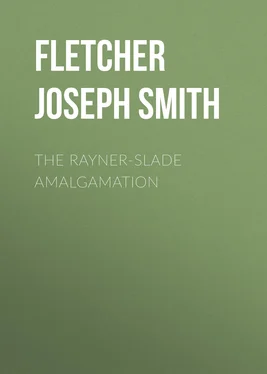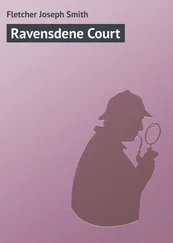Joseph Fletcher - The Rayner-Slade Amalgamation
Здесь есть возможность читать онлайн «Joseph Fletcher - The Rayner-Slade Amalgamation» — ознакомительный отрывок электронной книги совершенно бесплатно, а после прочтения отрывка купить полную версию. В некоторых случаях можно слушать аудио, скачать через торрент в формате fb2 и присутствует краткое содержание. Жанр: foreign_prose, Классический детектив, foreign_detective, foreign_antique, на английском языке. Описание произведения, (предисловие) а так же отзывы посетителей доступны на портале библиотеки ЛибКат.
- Название:The Rayner-Slade Amalgamation
- Автор:
- Жанр:
- Год:неизвестен
- ISBN:нет данных
- Рейтинг книги:3 / 5. Голосов: 1
-
Избранное:Добавить в избранное
- Отзывы:
-
Ваша оценка:
- 60
- 1
- 2
- 3
- 4
- 5
The Rayner-Slade Amalgamation: краткое содержание, описание и аннотация
Предлагаем к чтению аннотацию, описание, краткое содержание или предисловие (зависит от того, что написал сам автор книги «The Rayner-Slade Amalgamation»). Если вы не нашли необходимую информацию о книге — напишите в комментариях, мы постараемся отыскать её.
The Rayner-Slade Amalgamation — читать онлайн ознакомительный отрывок
Ниже представлен текст книги, разбитый по страницам. Система сохранения места последней прочитанной страницы, позволяет с удобством читать онлайн бесплатно книгу «The Rayner-Slade Amalgamation», без необходимости каждый раз заново искать на чём Вы остановились. Поставьте закладку, и сможете в любой момент перейти на страницу, на которой закончили чтение.
Интервал:
Закладка:
MR. FRANKLIN FULLAWAY
Allerdyke carried his find away to his own room and carefully examined it. The buckle was of real gold; the stones set in it were real diamonds, small though they were. He deduced two ideas from these facts—one, that the owner was a woman who loved pretty and expensive things; the other, that she must have a certain natural carelessness about her not to have noticed that the buckle was loose on her shoe. But as he put the buckle safely away in his own travelling bag, he began to speculate on matters of deeper import—how did it come to be lying there in James Allerdyke's room? How long had it been lying there? Had its owner been into that room recently? Had she, in fact, been in the room since James Allerdyke took possession of it on his arrival at the hotel?
He realized the possibility of various answers to these questions. The buckle might have been dropped by a former occupant of the room. But was that likely? Would an object sparkling with diamonds have escaped the eyes of even a careless chambermaid? Would it have escaped the keener eyes of James Allerdyke? Anyhow, that question could easily be settled by finding out how long that particular room had been unoccupied before James was put into it. A much more important question was—had the owner of the buckle been in the room between nine o'clock of the previous evening and five o'clock that morning? Out of that, again, rose certain supplementary questions: What had she been doing there? And most important of all—who was she? That might possibly be solved by an inspection of the hotel register, and after he had drunk the coffee which was presently brought up to him, Allerdyke went down to the office to set about that necessary, yet problematic, task.
As he reached the big hall on the ground floor of the hotel, the manager came across to him, displaying a telegram.
"For your cousin, sir," he announced, handing it over to Allerdyke.
"Just come in."
Allerdyke slowly opened the envelope, and as he unfolded the message, caught the name Franklin Fullaway at its foot—
"Let me know what time you arrive King's Cross to-day and I will meet you, highly important we should both see my prospective client at once."
This message bore the same address which Allerdyke had found in the telegram discovered in James's pocket-book—Waldorf Hotel—and he determined to wire Mr. Franklin Fullaway immediately. He sat down at a writing-table in the hall and drew a sheaf of telegraph forms towards him. But it was not easy to compose the message which he wished to send. He knew nothing of the man to whom he must address it, nothing of his business relations with James; he had no clear notion of what the present particular transaction was, nor how it might be connected with what had just happened. After considerable thought he wrote out a telegram of some length, and carried it himself to the telegraph office in the station outside:—
"To Franklin Fullaway, Waldorf Hotel, London .
"Your wire to James Allerdyke opened by undersigned, his cousin. James Allerdyke died suddenly here during night. Circumstances somewhat mysterious. Investigation proceeding. Have found on body your telegram to him of April 21. Glad if you can explain business referred to therein, or give any other information about his recent doings abroad.
"From MARSHALL ALLERDYKE, Station Hotel, Hull."
It was by that time eight o'clock, and the railway station and the hotel had started into the business of another day. There were signs that people who had stayed in the hotel over-night were about to take their departure by early trains, and Allerdyke hastened back to the office to look over the register—he was anxious to know who and what the folk were who had been near and about his cousin in his last hours. But a mere glance at the big pages showed him the uselessness of his task. There were some seventy or eighty entries, made during the previous twenty-four hours; it was impossible to go into the circumstances of each. He turned with a look of despair to the manager at his elbow.
"Nothing much to be made out of that!" he muttered. "Still—which are the people who came off the Perisco last night?"
The manager summoned a clerk; the clerk indicated a sequence of entries, amongst which Allerdyke at once noticed the name of Dr. Lydenberg. The rest were, of course, unfamiliar to him.
"There was a lady here last night, who, according to your night-porter, changed her mind about staying, and set off in a motor-car about midnight," observed Allerdyke. "Which is she, now, in this lot?"
The clerk instantly pointed to an entry, made in a big, dashing, artistic-looking handwriting.
"That," he answered. "Miss Celia Lennard—Number 265."
Two numbers away from James Allerdyke's room—Number 263! The inquirer pricked his ears.
"It was she who went off in the middle of the night," continued the clerk. "She pestered me with a lot of questions as to how she could get North—to Edinburgh. That would be about eleven o'clock. I told her she couldn't get a train until morning. I saw her going upstairs just before I went off duty—soon after eleven. It seems, according to the night-porter—"
"I know—he told me," said Allerdyke, interrupting him. "He got her a car, she wanted to be driven to some station on the Great Northern main line—I met her on the road at two-thirty. I suppose the driver of that car can be found?—he'll have returned by this, I should think."
"Oh, you can find him all right," answered the clerk. "The car was got from a garage close by."
Allerdyke jotted down the name of the garage in his pocket-book, and proceeded to make further inquiries about his cousin's movements on the previous night. He interviewed various hotel servants—waiters, chambermaids, porters, all could tell him something, and the sum total of what they could tell amounted, for all practical purposes, to next to nothing. James Allerdyke had come to the hotel just as several other people had come. He had been served with a light supper in the coffee-room; he had been seen chatting with one or two people in the lounge and in the smoking-room; a chambermaid had seen him in his own room—according to all these people there was nothing in his appearance or his behaviour that was out of the common, and all agreed that he looked very well.
The manager, who accompanied Allerdyke in his round of these inquiries, glanced at him with a puzzled expression when they came to an end.
"Of course, sir, if you would like the police to be summoned," he suggested for the second time. "Perhaps—"
"No—not yet!" answered Allerdyke. "I daresay they'll have to be called in; indeed, I suppose it's absolutely necessary, because of the inquest, but I'll wait until I hear what these doctors have to say, and, besides that, I want to get some news from London. It's a queer business altogether, and if there has been any foul play, why"—he paused and looked round at the people who were passing in and out of the hall, in a corner of which he and the manager were standing—"we can't hold up all these folk and ask 'em if they know anything, you know," he added, with a grim smile.
"That's the devil of it! If there has, as I say, been aught wrong—murder, to put it plainly—why, the criminal or criminals may already be off or going off now, amongst these people, and I can't stop them. In a few hours they may be where nobody can find them—don't you see?"
The manager did see, and shrugged his shoulders with a gesture of helplessness. Again he could only suggest expert help from the police—but this time he added to his suggestion the remark that he understood there was nothing for the police to take hold of—no clue, no signs of foul play.
"Not yet," agreed Allerdyke. "But—there may be. Well, I'm afraid that register is no good. It's meaningless. A list of names conveys nothing—except for future reference. For the present we must wait. But—in any way you can—keep your eyes open. There's one thing you can do—there was a lady in here last night who took Room 265 and left it at midnight to go away in a motor-car which your night-porter got for her. I particularly want to see the chambermaid who attended that lady. Let me see her privately—I've a question to ask her."
Читать дальшеИнтервал:
Закладка:
Похожие книги на «The Rayner-Slade Amalgamation»
Представляем Вашему вниманию похожие книги на «The Rayner-Slade Amalgamation» списком для выбора. Мы отобрали схожую по названию и смыслу литературу в надежде предоставить читателям больше вариантов отыскать новые, интересные, ещё непрочитанные произведения.
Обсуждение, отзывы о книге «The Rayner-Slade Amalgamation» и просто собственные мнения читателей. Оставьте ваши комментарии, напишите, что Вы думаете о произведении, его смысле или главных героях. Укажите что конкретно понравилось, а что нет, и почему Вы так считаете.












